Learn about the benefits of constructing a multi-year internship from a MLIS student's perspective.
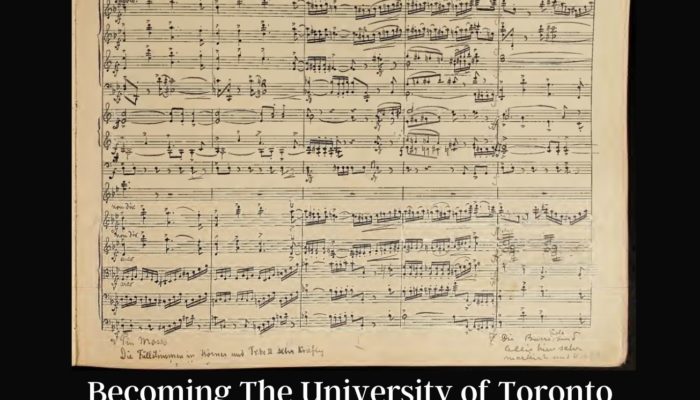
Harvey Olnick Rare Book Room
By: Rebecca Shaw
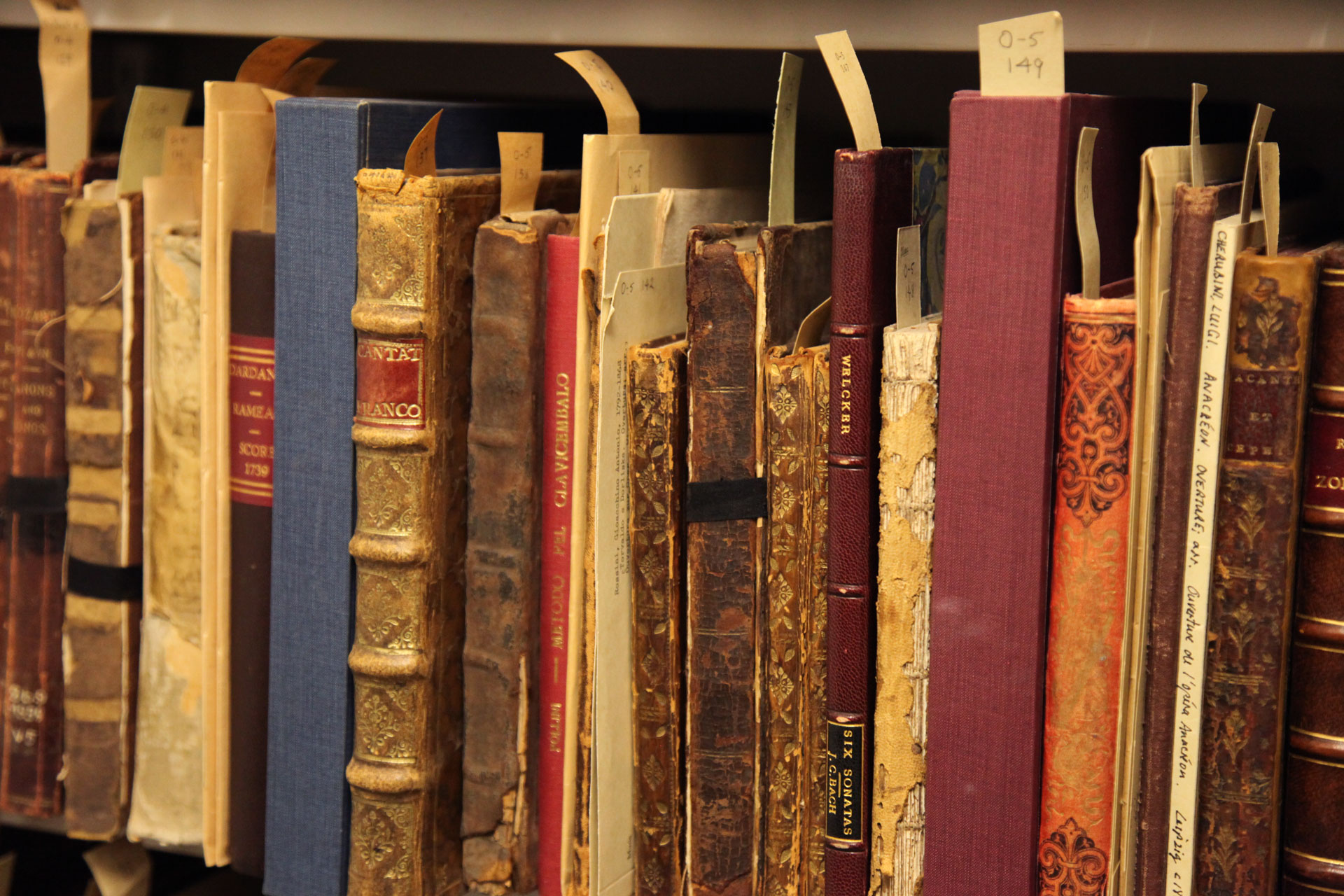
The Harvey Olnick Rare Book Room at the University of Toronto Music Library contains over 2,600 volumes that exemplify the history of music, music editing, performing and printing—from liturgical manuscripts and early printed treatises to first editions of Mozart, Haydn, Beethoven and Gershwin. It includes a significant number of eighteenth- and nineteenth-century opera full scores, with particular strength in the French repertoire complimenting the large libretto holdings of the Thomas Fisher Rare Book Library.
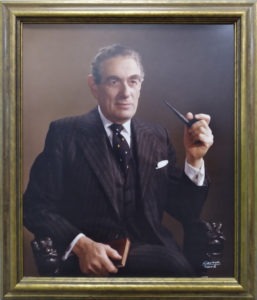
Its namesake, Harvey Olnick, joined the Faculty of Music in 1954 at the request of then-director Dr. Arnold Walter. Olnick’s mission was to establish the first musicology program at a Canadian university. Before moving to Toronto, Olnick taught at Vassar College in Poughkeepsie, New York for a year, where he crossed paths with the classical scholar Elizabeth Hazelton Haight. Upon hearing of his new appointment, Haight wrote him a congratulatory letter, dated October 24, 1954, which we hold in our archives: “Earl Groves has just told me that you have an Associate Professorship of Musicology at Toronto. I write at once to congratulate you on this fine post. The University is fortunate to have you.” As time would tell, the University—and particularly the Music Library—was indeed most fortunate to have Prof. Olnick.
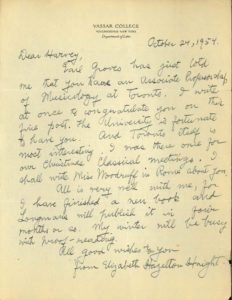
In addition to being the “founder of musicology” in Canada, Olnick was also the founding secretary and chairman of the Graduate Department of Music at U of T and was instrumental to establishing the U of T Electronic Music Studio (UTEMS) in 1959. Although he did not have much to do with UTEMS past the 1960s, a few of his tapes still remain in the collection, now held in the Music Library archives.
Following his retirement in 1983, a former student and then colleague, Carl Morey, described his teaching style in the University of Toronto Faculty of Music News:
Brash, aggressive and irritating as he undeniably can be, Olnick is modest and retiring when attention turns on him; his energies have all been for his students and for this Faculty….When I was an undergraduate in the Faculty in the 1950s, Harvey Olnick set me the task of a report on the songs of Charles Ives. In my undergraduate way, I found the songs trivial and crude, but I knew that Ives was then increasingly acknowledged to be an important American composer and I reasoned that Olnick, a recent arrival from the United States, would expect me to report accordingly. I engineered what I thought would be appropriate, but in no time Olnick skewered me with my own lack of conviction and roasted me on my own contrivances. Lord knows how many of us have since been similarly “olnicked” into learning that there is no substitute for arriving at one’s own conclusion. But he is not all abrasiveness. Another time, when I expressed wonder and enthusiasm for a Mozart quartet I had just discovered, he took the score from his shelf and gave it to me. I still have it.
While Prof. Olnick gave one score to Morey, he gave hundreds to the Music Library, gifted from his own collection and purchased on their behalf. As he describes it in his oral history, conducted at his home in July 1986 for the University of Toronto Archives by a former student of his, Valerie Schatzker: “I built the library virtually with my bare hands…without any authority to do so whatsoever. I just decided it should be done…I appointed myself to the Chairman of the Library Committee…”
As Betty Nygaard King and Robin Elliott write in The Canadian Encyclopedia entry for Prof. Olnick, “it was largely through his efforts that its [the Faculty of Music’s] library became the finest in Canada.” In the annual President’s report for the University throughout the 1960s, there is invariably a mention of the Music Library and Olnick’s contributions: “The Edward Johnson Library under the guidance of Miss. Jean Lavender, Librarian, and with the unswerving devotion and enthusiasm of staff adviser Professor Harvey Olnick continues to grow both in holding and in the use made of the facilities.” (June 1966, p. 101-102).
The Music Library’s rare book collection and reading room, named for Prof. Olnick, benefitted substantially from his involvement. When Olnick worked with library staff in the late 1960s to enrich Music Library holdings in the field of music and musicology and thus support the growing graduate programs, “rare books” were one of his major areas of focus.
In addition to those volumes acquired under his influence as staff adviser, Olnick also donated much of his own collection to the Music Library. Many of the volumes in the rare book vault bear a donation plate with Olnick’s name. 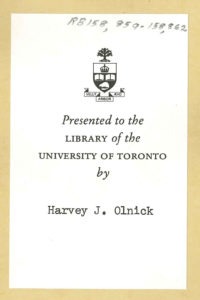
A few selected highlights from a donation in the late-1980s:
1. Messe brevi a otto voci by Maurizio Cazzati (Bologna: Per Antonio Pisarri, 1662)
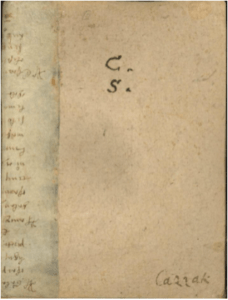
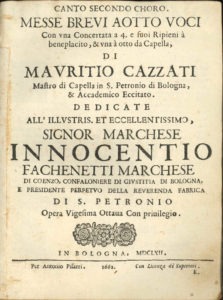
Cazzati (1616–1678) was an Italian composer and organist. This mass, written and published in 1662, was written whilst he was maestro di cappella of S. Petronio, Bologna (1657–1671). The copy in our rare book collection is one of only about 10 surviving copies in libraries worldwide.
2. Frank Ayliffe and Walter Willson Cobbett, Library Catalogue of the Chamber Music Association [London, 1938]
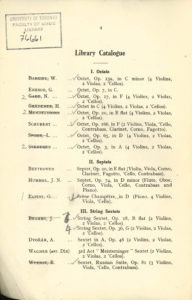
3. Dictionnaire de musique by Jean-Jacques Rousseau (Paris: chez la veuve Duchesne, 1768)
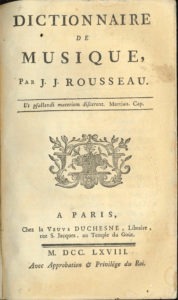
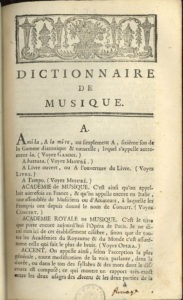
A first edition publication of this important reference work written by the Swiss philosopher, theorist and composer Rousseau (1712–78), Dictionnaire de musique has over 900 entries and is the earliest modern dictionary of music.
In the year preceding Olnick’s retirement, he was involved in yet another effort to improve the rare book collection, expanding the library’s collection of French opera scores through a grant from the Social Sciences and Humanities Research Council (SSHRC). The library already had 150 full scores in this area, which were the result of “several years of careful buying by Professor Harvey Olnick.” The successful SSHRC grant added another 42 full scores, various microfilm facsimiles and over 300 other related scores for the regular, circulating score collection.
Among those purchased at the time were:
1. Sémiramis by Charles-Simon Catel (Paris: Au Magasin de Musique …, 1804)
French composer and theorist Catel (1773–1830) wrote his first opera, Sémiramis, in 1802. In 1810, it won an honourable mention in the decennial prize for the best musical dramas at Paris Opéra.
2. Le Prisonnier by Domenico Della Maria and Alexandre Duval (Paris: Du fonds Des Lauriers, 1800)
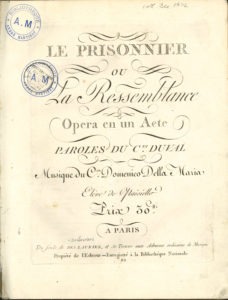
3. Acante et Cephise by Jean-Philippe Rameau (Paris: Chez L’auteur, 1751)
A first edition publication of this opera, likely performed at Choisy for the birth of Louis, Duke of Burgundy by France’s leading 18th-century composer, Rameau (1683–1764)
Although Olnick was by no means the only contributor to the rare book collection—there were other donors, other grants and, other purchases—it would not be what it is today without his influence and support. To explore this collection further, check out our digitized collection of opera scores on the Internet Archive, read our blog posts that feature items from this collection and follow us on Instagram (@uoftmusiclib) for featured items from the Music Library’s many collections, including rare books.
Music Archivist Rebecca Shaw works at the University of Toronto Music Library. Before moving to Toronto, she received her Master of Library and Information Studies (2018) and Master of Arts in Musicology (2019) from Dalhousie University, and has held various positions in university and museum archives and as a music research and teaching assistant.
References
Elliott, Robin. “Harvey (Joel) Olnick 1917-2003.” In ICM newsletter 2, no. 1 (January 2004): 2–3.
Morey, Carl. “Harvey Olnick and Godfrey Ridout.” In News, vol. 12. University of Toronto Faculty of Music (Spring/Summer, 1983).
Nygaard King, Betty, and Robin Elliott. “Harvey Olnick.” In The Canadian Encyclopedia. Historica Canada. Article published July 2, 2007; Last edited December 11, 2013.
University of Toronto. President’s report for the year ended June 1966.
University of Toronto Archives. Library Oral History Programme collection. UTA 5001-B1986-0074.
University of Toronto Music Library. Faculty of Music collection. OTUFM 04.
University of Toronto Music Library. Toronto music life collection. OTUFM 03.
University of Toronto Music Library. University of Toronto Electronic Music Studio tape collection. OTUFM 54.


